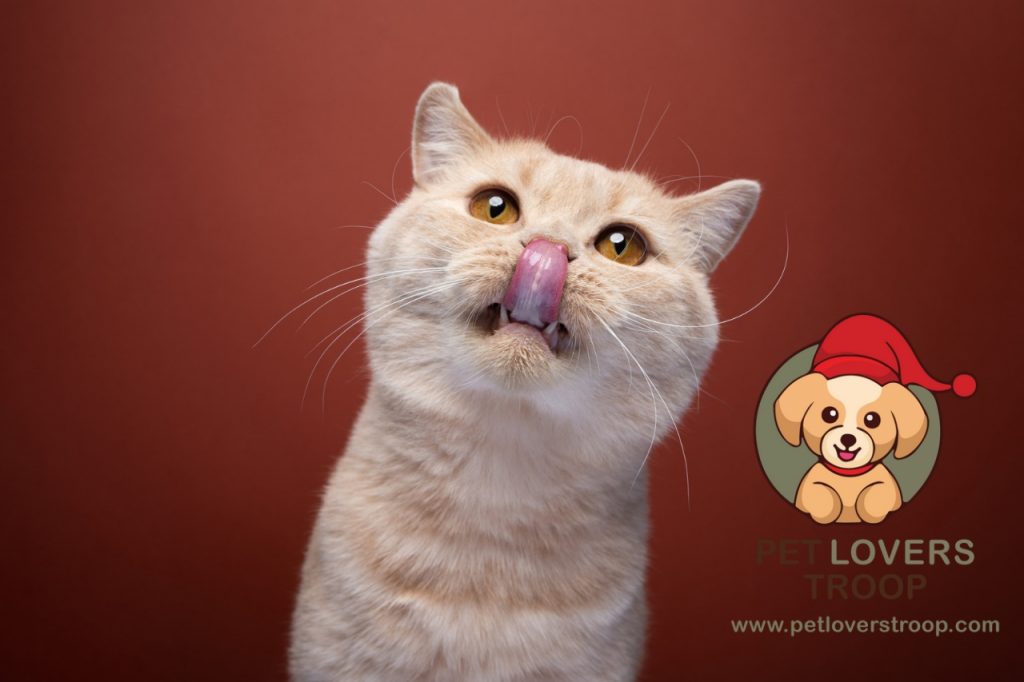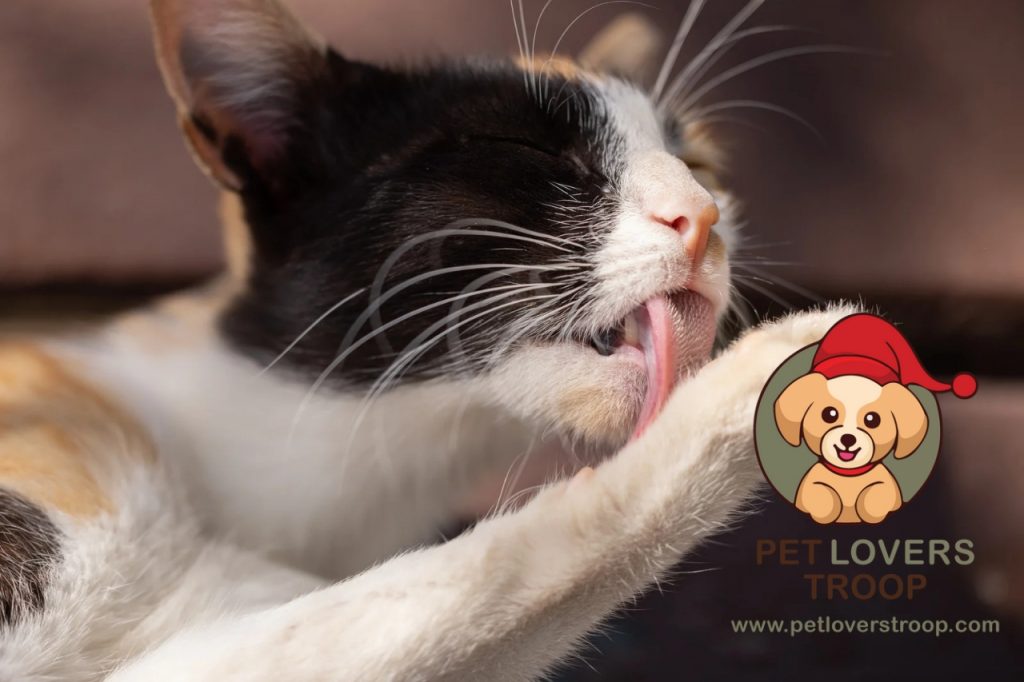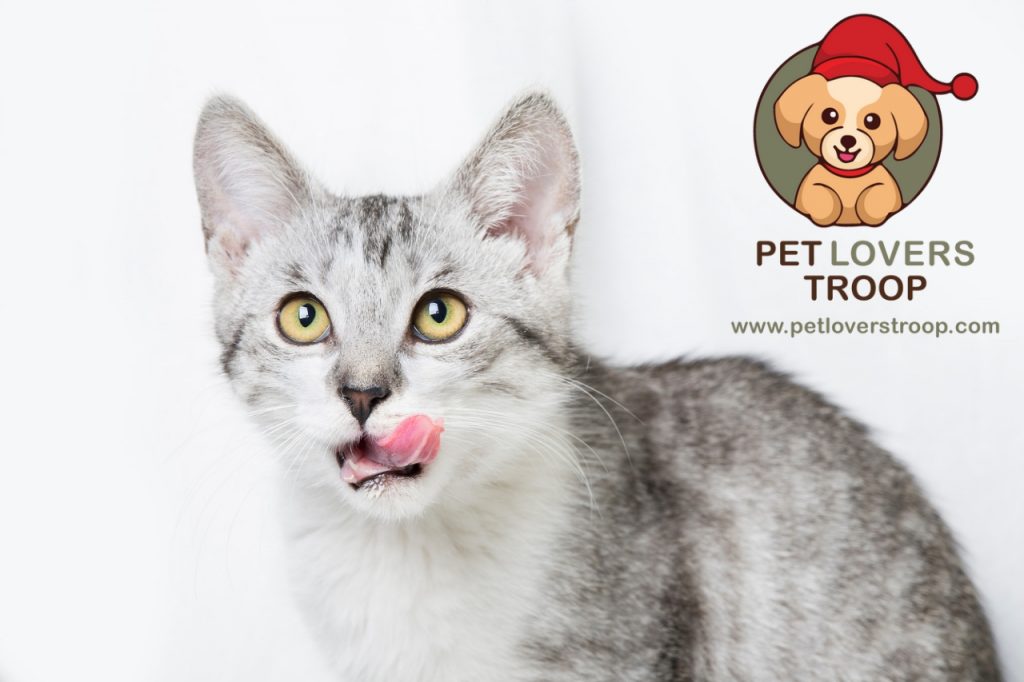Cats are very interesting animals and they possess many traits that amuse their owners. Licking is one of the numerous habits of cats. You may have a feeling that your cat is genuinely fond of you when, in fact, they may simply be licking you.
As it can be seen, this behaviour is entirely fundamental to feline instinct and feeling. The cat’s tongue is hairless and covered in small sharp projections known as papillae, the tongue is used mostly for cleaning. However, when your cat decides to extend this habit to you it is asking for something far deeper.
Read more: The Science Behind Cat Meowing: What Your Feline Friend Is Trying to Tell You – December 2024
There are several causes for which your cat licks your hand, face, or any other body parts, from showing love to seeking attention or comfort. Understanding these reasons can help you respond appropriately and strengthen your bond with your furry friend. Let’s explore the meaning behind this common cats behaviour.

Why Does My Cat Lick Me? 9 Possible Reasons
A cat’s tongue is uniquely designed with tiny, hook-like structures called papillae, which serve as natural grooming tools. These rough barbs give their tongues the sandpaper-like texture we all recognize.
Cats use their tongues primarily for self-cleaning, but when they extend this behaviour to humans, it signals something more profound. Here are some common reasons behind this behaviour:
Read more: 8 Reasons Why Cats Love Bathrooms – December 2024
1. Showing Affection
When your cat licks you it is because of the love and affection it has for you. This behaviour is latent from their kittenhood as licking the fur of a mother cat was a sign that she was fond of her kittens.
This way, the cat that licks you not only builds a close connection and shows that it trusts you. For them, it stretches as far as a kiss or a hug would for us. This is a warm way they take time to let your loved ones tell you the simple things of life, “you are loved.”
2. Marking You as Their Territory
Domestic cats belong to the territorial category of animals by their nature. In doing so they are asserting themselves and claiming you are a part of their territory by the act of you being licked.
Read more about : The Benefits of Regular Exercise for Cats
This act lets out chemicals that its target or any other animal can see as a sign that you are now on their team. Licking your face is a sign they want to remind other pets and animals that are around you that you belong to them. It also communicates to the world, “This human is mine.”
3. Grooming You
Grooming for a cat is both instinctual and social. They may bite you to groom you as their relatives since instinct makes them little cleaners. After all, as we know, your cat doesn’t groom you because you need grooming, but because they think your assistance benefits them.
This tender behaviour is inspired by how a mother cat licks her young. When your cat makes use of its rough tongue to lick you, then be sure they are showing you that you belong to them.
Have a look at: Benefits of Owning a Cat: 10 Reasons why Cats Make the Best Pets
4. Seeking Attention
Cats being intelligent creatures notice everything. If your cat licks your hand or arm when you are busy, the cat probably wants to get your attention. Licking, they quickly find out, can prompt any response ranging from petting, feeding or even maintaining eye contact with them. Such behaviour resembles other attention-seeking behaviours which include pawing or meowing which are characteristics of this need for interaction.
5. Coping with Stress or Anxiety
Licking has been noted to be some form of comfort-seeking behaviour in cats whenever they are stressed. If the cat changes its environment, for example, the house was recently moved, new neighbours appeared or a new pet joined in, your cat will lick you to calm down.
These repeated actions serve as an anchor that makes them feel alright in some way. Although, extensive licking might be an indication of an increased stress state it is recommended to consult with your veterinarian if it is still ongoing.
Check out: Why Does My Cat Lick Me?
6. Seeking Comfort from Nursing Behavior
Newborn kittens which are denied an early maternal care may display nursing behaviors throughout their lifetime. This bodes well with grooming as they also lick or even suckle your skin bringing back feelings of nursing.
This behaviour is exhibited most often in cats that never had their mothers or whose mothers were taken away from them when they were still very young, or cats that were weaned very early. It is evidence that such people consider you as their guarantors of security and protection.
7. You Taste Good
Cats have an amazing sense of taste as well as smell. Your skin might have residues of food or have oily sweat or salty taste that the cat likes. If your cat licks you, then it might just be because your skin has a nice taste, as strange as this may sound. This reason can often be termed as more functional than emotional, it could be the leftover from a yummy meal or just the basic human smell.
Read more: The Flea Fiasco: How Long can these Pesky Pests Survive Without their Favourite Hosts?
8. Expressing Annoyance
Compromising is not always a kiss; sometimes it is a lick with a hint of a threat. This body language may look like play aggression but is often meant to communicate “Stop touching me!” to the cat’s companion if your cat is getting overstimulated, for example, from being petted too much or held for too long it will lick you as it is trying to tell you “Enough.” If this warning is not heeded then you may feel a little nip or scratching from your cat as it tries to tell you something.
9. Enjoying Positive Reinforcement
Cats have a positive correlation between licking and release of endorphin, making the cats happy. When you react positively such as by smiling at the behavior or perhaps offering them a treat then you encourage the behaviour. Eventually, your cat starts associating being licked with receiving something beneficial thus they are always ready to be licked. It enhances your relationship and also makes your companion happy and playful.
Have a look at: Eclipse Safety for Cats
Is It Safe to Let Your Cat Lick You?
In general, most owners do not have anything dangerous happen to them when their cat licks them. However, there are a few considerations that you should keep in mind:
- Bacteria and Infections: A cat’s mouth harbours germs which if injected into an open wound or any tender part of the body will lead to some form of infection. Do not allow your cat to lick any open wound you may have as a canine, be sure to wash your hands.
- Skin Sensitivity: It might be painful for the skin since the surface area of this organ is rough, at least for many cat lovers. This can be glaring if your cat licks a certain place frequently.
- Toxic Substances: If you have recently treated your cat to some lotion, ointment or any other product, this will be dangerous to the cat if swallowed. People should always read the labels to find out whether those particular products are safe for their pets. Also, do not use strong odours that may interest your cat and it always licks the region with interest.
Licking is all well and good once in a while, but you have to watch that rather instinctive behaviour more stringently, for the sake of your, and your feline’s, well-being.

How to Respond to Cat Licking
Some individuals might love the cats licking while others might not like that feel on the skin. Here are some ways to manage this behaviour:
- Redirect Their Attention: To stop your cat from licking you can offer toys or play with the cat to keep him or her busy. One of more active is to engage toys such as the feather wands or laser pointers.
- Encourage Alternative Behaviors: While your cat is actually engaging in non-licking kinds of behavior — like sitting calmly beside you — reward your cat with positive reinforcement. Rewards are treat or gentle petting.
- Limit Access: If your cat uses tongue to wash your face or your hands, try to redirect the cat to avoid it because you don’t find it comfortable. If this is done then they will be able to learn it when the response is consistent.
- Provide Comfort: In case licking is attributed to stress, you should ensure your cat is calm with lots of things to do to keep her busy. A scratching post, a climbing tree, or even a simple safe hideaway might help to alleviate the problem.
Using reasoning in engaging with the cat and trying to understand why the feline is performing this habit, can assist in preventing the kernels of this behavior while keeping a good relationship with the animal.
Read more: The Benefits of Regular Exercise for Cats
When to Seek Veterinary Advice
Licking behaviour may sometimes show sighs of other related health complications or extreme anxiety. If your cat has bad skin or fur, and if he starts scratching its body, or licking its legs too much then you should contact the vet. They are capable of diagnosing the problem and possibly suggest a course of action that will serve the need of your cat.
In some circumstances it could be related with allergies or pain, not speaking of neurological disorders. In most cases your veterinarian will recommend modifying the diet, making changes in the environment, or giving medication to help with the problem. It also explains why people should visit their doctors for check-ups, how it can identify these problems and have them fixed right away.
Always consult your doctor if you experience any strange or different behaviors than usual. Taking quick action may have a great impact to the body health of the cat.

Embracing the Quirks of Cat Licking
Being a cat owner, one has to accept how they express their love and affection as they do. Learning about reasons for licking helps the owner realize that it strengthens the connection with the pet, a cat.
Regardless of whether it needs to be rewarding for affection, a means of attracting your attention or a mere oddity, an appropriate reaction leads your cat to adopt the thought that everything is alright, it is safe, and therefore protected and loved.
Keep in mind that licking is an inherent behaviour of cats’ instincts. Now and then it may be bewildering or even insensitive but it remains one of the ways that they feel and share with you. You only need to train them and follow their body language, which will help you build a friendly environment for both of you.
know more about: Unveiling the Unique Personality Traits of Persian Cats: A Comprehensive Guide to Care-January 2024
Final Thoughts
When your cat licks you, it’s not just grooming…well, it sort of is but it is so much more than that. Licking is associated with play, bonding, asserting dominance or territory, soliciting and gaining attention, and teling when stressed. If you know why your pet acts in such a manner you can improve your relationship and make your pet feel secure and loved.
However, licking is not really dangerous and what must be immediately observed and reported to the veterinarian is any sign of over licking or a licking that is not typical of the pet’s normal behavior. If you get licked by your cat, it is important to show that to him or her by responding kindly and also giving him or her the best environment to be happy and comfortable in.
Accept such minor oddities as the signatures of the bond that you two have as master and pet, respectively. Still, those crude little raspy ones are only added ways your feline tells you, “I am fond of you.”
